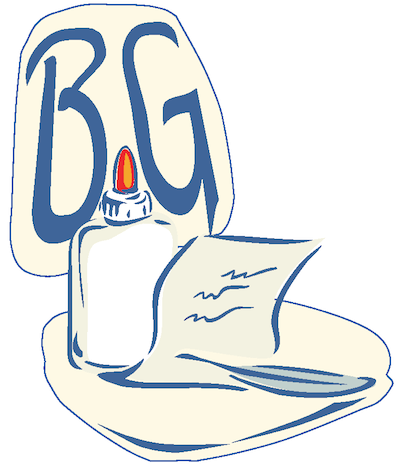 The best thing I ever did for my writing was to join a writers group. When I relocated from Chicago to Charleston, SC, I bumped into a local group (a chapter of the South Carolina Writers Workshop) and was enthralled by the mix of talent and the eagerness of each of the members to help the others.
The best thing I ever did for my writing was to join a writers group. When I relocated from Chicago to Charleston, SC, I bumped into a local group (a chapter of the South Carolina Writers Workshop) and was enthralled by the mix of talent and the eagerness of each of the members to help the others.
Within a few years, six of us branched off into our own “tribe.” We called ourselves the Butt Glue Club, with a single club rule – to park our butts in the chair and write for a minimum of 20 minutes a day. We’re now seven strong, an eclectic mix of literary and upmarke fiction writers. We’ve become great friends, and have had the opportunity to befriend a great cast of our fictional characters in the process.
We also share each other’s writing journeys, with congratulations when the feedback is good, whether from a contest or an agent’s input, and with commiseration when the feedback’s not so great. And I know I speak for us all when I say that if one of us is going to put a piece of work out on the street, we want the eyes of our fellow BGs on it first. I’m ever grateful and in awe of the generosity of spirit within this group. For those of you already thriving a great writer’s group, you know what I mean; writers really do rock!
As so many authors will tell you, there’s tremendous value and joy in belonging to an established writers group. Writers can encourage each other, help each other keep to deadlines, critique each other’s work, exchange marketing ideas, pick each other up when we fall into a slump, and be an overall support system. Writing is a solitary activity; writing groups can put a whole team in your corner.
Here then are five tips for finding, joining or launching a writers group that will benefit you:
1. Pick Your Focus
The more narrowly you define the scope for your writers group, the better chance you’ll have of attracting and nurturing the members that will serve each other best. Typically this is broken down by non-fiction vs. fiction writers, but it can also be by genre (romance and mystery writers have plenty of groups, for instance). Or you may choose your group based on similar skill levels or needs. Beginning novelists may spend more time discussing general aspects of the craft. Advanced writers may spend more time honing final manuscripts or networking for marketing purposes.
2. Decide on the Group Size
The best groups are 5-8 people. Not too big so that everyone has a chance to share their work, and not too small so if someone doesn’t show up there’s still enough varying input.
3. Choose Group Members Carefully
Nothing will destroy a good group faster than negative Nellies, or folks who won’t pipe up at all for fear of offending someone. You want writers who are able to both give and receive genuine advice and support, fellow writers with a pro-active outlook and the willingness to hone their craft and become better. A writers group should be a “safe space” where each of you can bring your work for honest assessment, and know that any criticism given is out of mutual respect and a sincere desire to help each other make the work better.
4. Set Some Rules to Remain Productive
In our own group, we decide some time before the next meeting who the focus might need to be on, or if several of us have something to share. Sometimes someone needs attention for their full manuscript and so we schedule a meeting devoted just to them. Groups typically will submit between one and five thousand words, and it’s more productive if you assign a deadline at least five days in advance so members have time to read and think about the work. It’s also great to take the last five or ten minutes of the meeting to set the next date, and to ask each member for their goals for the next meeting so you can help each other stay on track.
5. Where to Find Fellow Writers
Initially you may want to find and participate in existing groups. One may satisfy your needs, or you may find writers within them ready to split off. If you’re not sure where to begin, here are the most likely places in which you’ll find your fellow writers lurking:
- Your local library
- Your local bookstore (the coffee shops in Barnes & Noble and Books-A-Million are common meeting locations – check to see if they host or know of any groups meeting there).
- Your (other) local coffee shop
- Local women’s, men’s, or church organizations
- State writers organizations (Google your state writer organization or humanities council; they may already have or know of a chapter near you!)
Are you part of a writers group you love? Tell us about it, how you started or found it, and why it works for you!
 Creator of Where Writers Win, Shari Stauch has been involved in publishing, marketing and PR for 30 years. She is also the principal author of the WWW blog, and speaks at conferences around the country. The Where Writers Win team’s newest collaboration is The Winner Circle – vetted book review directories, book clubs and other cultivated resources for emerging authors.
Creator of Where Writers Win, Shari Stauch has been involved in publishing, marketing and PR for 30 years. She is also the principal author of the WWW blog, and speaks at conferences around the country. The Where Writers Win team’s newest collaboration is The Winner Circle – vetted book review directories, book clubs and other cultivated resources for emerging authors.
The graphic was created for the Butt Glue Club by artist and illustrator Karin Kaltofen – now if we could just get her in her own chair writing…

Thanks for the post Shari. I’m just finishing up some online writing classes and have been mulling over how to continue the bum-in-chair commitment (support and quality constructive feedback) that comes from taking writing classes together. I’ll be sending your link to a few of my classmates to see if we might be able to create our own writer’s group. Happy writing 🙂
That’s a great idea, Diane! Thanks for sharing, write on and let us know how it goes 🙂
Great blog! I’ve attended a couple of butt-glue meetings (not w/ my own writings but as an objective observer), and can’t say enough about how impressed I was, both at the content and the critiques — probably learned more at those meetings than an entire semester of college creative writing. Can’t wait to start writing again and sharing my stories with my butt-glue comrades. 🙂
Thanks, Karin – and for the most excellent artwork, too! Bring it on… 🙂
Disclaimer from me, too — I’m a Butt Glue-er! And I echo fully the words that came before me that celebrate the treasure this tribe is. I can tell you I would not be the writer I am today without the minds and hearts of these amazing people. They’ve been with me through an umpteen number of drafts of my novel and, just last month, read still the latest draft. I am SO GLAD I passed it by them one more time. Their feedback lifted the book up another notch. I’d be lost without them.
Amen and thanks for commenting, Bren – I know the whole group is excited about your work and can’t wait to share celebrating its release, too!
Great blog post, Shari! I’ve enjoyed reading your essays and fiction over the years, first in our SCWW chapter, now in our BG group. I am in awe of the talent my fellow BGs bring to the table. The honest feedback on my own work is a huge bonus.
Thanks, Frances – fellow fictionista – now if only the rest of us could write poetry like you do – afraid we’re of little critique use on that score, LOL. Yes, they’re an eager, brilliant bunch and so cool to see others posting about their own tribes here, too. Conclusion: A great writers group isn’t an aberration, but rather what can happen when five or more effervescent authors are shoved into the same test tube – an explosion of ideas and talent!
Disclosure! I’m the newest member of the BG Club here in Charleston. It’s the rarest of times when “tough” and “love” carry equal weight. If they didn’t love ya’ or your work, they wouldn’t care enough to be tough. I’ve never seen a group so invested in each other’s work, have such deep knowledge of each other’s characters, cheer the loudest at each and every victory, and commiserate with heart when it’s called for. We share a deep and mutual respect and I can’t remember what I ever did without them. I’m a better writer because of them and a richer individual just having them touch my life.
You got it, sister! We’re ALL better writers for knowing each other… I’m really enjoying the other comments from folks, too – more hard evidence that writer tribes really offer that unbeatable level of support and generosity of spirit that make it actually easier to become better. I know for myself, reading others’ great work with a critical eye has become just as important to the learning process – what works, what doesn’t, what needs just a smidgen – a word or a line – to pack a real punch. Always in awe of what can be learned and shared between dedicated writers!
A lifestory group at our library is in its seventh year. Keys to success:
* The facilitator keeps the focus on WRITING, not telling spontaneous stories sparked by what was just read.
* We meet twice a month, specifying weeks to keep meetings predictable.
* It’s open to anyone, but content is limited to material based on personal experience.
* Reading time is limited to about five minutes, to give time for comments. Those with longer pieces may opt to go last, using whatever time is left.
* Suggestions for improvement are wrapped with remarks about what worked well.
* Sharing personal stories builds strong bonds. We are a family! People drift in and out of the group over time, but are never forgotten and always welcome to return.
Love this, Sharon – and thanks for sharing. Great focus and definitely sounds like a winning recipe for success!
We are the Serivilous Panerians, meeting twice monthly at our local Panera store for the past two years or more. There are now seven of us with attendance averaging five members. Our group edits each others work, gives advice, helps with marketing, mentors and supports one another in ways too numerous to mention. They are my partners and my friends. I wouldn’t trade this group for anything.
Perfectly said, Cheri – Once you establish a great one, wouldn’t trade ’em for the world! How did you find each other and is there a genre or topic focus?